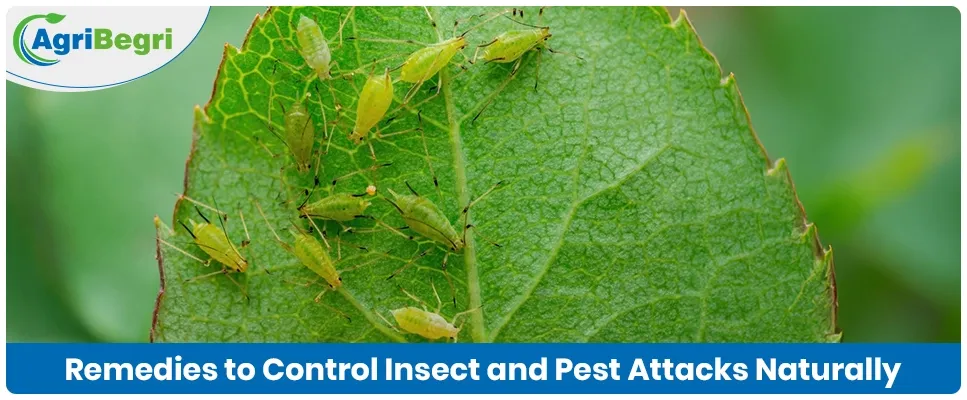Every season, farmers face countless challenges—from sowing to harvest. Pests and insects silently eat away at our crops, leaving us with heavy losses and damaged harvests. This often forces farmers to turn to chemical pest control for quick results. But we need to ask ourselves, is it a wise choice for the future?
Chemical pesticides pose long-term risks to crop quality. They are also harmful to us humans due to their toxic chemical composition and can damage soil health permanently. That is why relying on natural pest control remedies is a wiser choice. Through this guide, we will understand why natural techniques are important and how to identify pests.
Why Natural Pest Control Matters in Indian Farming
The overuse of chemical pesticides disrupts the balance. This damages the helpful organisms and also increases resistance to chemicals in targeted pests. Realizing this, more people are turning towards less toxic and natural remedies to prevent crop loss.
These methods are safer and adaptable for small and medium-scale farmers without heavy investment. Organic farming and production for the local market can be supported very well through such remedies.
Identifying Common Pest Problems in India
Prior to applying pest control remedies, we should understand the type of pests that we could be facing. These are the types of pests that we commonly face in our Indian farmlands:
Sucking Pests:
These insects suck the sap from plants, weakening our crops over time.
- Aphids - Seen in crops like brinjal, mustard, etc.
- Whiteflies - Especially observed on cotton and tomato crops.
- Mealybugs - They affect fruits like papaya and mango.
- Jassids - These are widespread in cotton and okra (also known as Ladyfinger).
Chewing Pests:
As the name suggests, they chew leaves, roots, or stems. Their impact is often visible as cuts or holes.
- Caterpillars - Widely found on cabbage, tomato, and gram (chana).
- Grasshoppers - They affect paddy and millets (rice & bajra).
- Beetles - They feed on pulses and the groundnut crop.
Soil-Borne Insects
These pests target lower stems and roots. They can be invisible until it's too late and the yield is damaged beyond control.
- Termites - Commonly found in sugarcane and wheat, as well as domestic pests.
- Root grubs - They are found in maize and sugarcane.
- Cutworms - These can be seen in tomato, green leafy vegetables, and potato crops.
Natural Pest Control Remedies That Farmers Use
Many of us belong to a family that has been farming for many generations. This age-old knowledge on pest control remedies has been passed down to us through our lineage. These methods are effective, farm-friendly, and affordable when used properly.
Neem-Based Sprays
Neem is a natural healer and nature’s own pesticide. Ayurveda mentions neem in high regard and as a vital source of immunity for plants as well as humans. The bitter compounds of neem disrupt pest reproduction and feeding.
- When mixed with water, a 2%-5% Solution of Neem oil effectively deals with sucking pests.
- A stronger and easier-to-make option could be Neem Seed Kernel Extract (NSKE).
- Using them regularly, every 7 to 10 days, can yield the best results.
These neem sprays are highly effective for vegetable crops such as pulses and cotton. According to the official government studies, using neem seeds as powder and pellets are proven to be fruitful.
Biological Insecticides
This category of pest control remedies uses naturally occurring organisms, such as fungi, viruses, or various other microbes. Biological insecticides are living microorganisms that target pests without harming humans or crops.
- Bacillus thuringiensis (Bt) - Used to control caterpillars in rice and vegetables.
- Trichoderma - Used for soil-borne fungi.
- Beauveria bassiana - Works against aphids and whiteflies.
They help promote long-term pest control and are environmentally safe.
Intercropping and Trap Crops
Planting different crops breaks the breeding cycles of pests. This happens because certain types of pests rely on a specific type of crop as their food and nesting ground. Here are a few examples:
- Planting marigold with brinjal reduces fruit borer caterpillar pests.
- Sowing rows of mustard between cabbage acts as a trap for diamondback moths.
- Cotton planted with maize reduces pink bollworm larva damage.
While offering natural pest control, these methods also enhance soil health.
Cow Dung and Herbal Mixes
Some quick and eco-friendly solutions are the mixtures that are locally sourced and naturally available.
- A combination of cow dung, milk, curd, ghee, and cow urine is called Panchagavya. This ancient mixture is known for repelling insects and boosting plant immunity.
- Herbal solutions that are made by fermenting tobacco, green chili, garlic, and ginger can be sprayed to effectively control pests.
- In dryland farming, a mixture of ash and buttermilk is used as a spray to prevent fungi and minor pest attacks.
We can easily prepare these pest control remedies at home, making them a cost-effective option.
Application Methods for Natural Remedies
Applying the right kinds of methods and choosing the right remedy are both equally important. An unsupervised, misused, or overused application can reduce effectiveness and damage the plant.
Dosage and Dilution:
- We should avoid making stronger mixes, thinking that strong mixes are more effective. Following the instructions for dilution gives great results.
- Mixing 30 ml of neem oil for every 1 litre of water and a mild soap can be a productive step.
- If the mixtures are homemade, we should filter them first to prevent blockage of the nozzle.
Spraying Techniques:
- By spraying early in the morning or late in the evening, we can avoid the damage caused by harsh sun.
- Spraying on both sides of the leaves can provide complete pest control.
- We should spray repeatedly between 7 to 10 days, especially after heavy dew or rain.
Maintaining consistency in application methods can help us maintain long-term control.
Benefits of Using Natural Remedies Over Chemicals
Soil Health
These natural pest control remedies improve soil health and protect the helpful microorganisms.
Natural Fertility
The remedies also boost the soil’s natural fertility.
Safe to Handle
They are also safe to handle, free from the chemical’s toxic smell, and are safe for spraying.
Resistance Prevention
These natural remedies also stop pests from becoming habitual or resistant over time.
Eco-Friendly
They are gentle on bees, birds, earthworms, and comparatively affordable.
Region-Specific Practices for Natural Pest Control
In India, different regions have their unique climate and soil conditions. Pest control methods also vary by soil and climate type. To prevent underground pests like nematodes, neem seed cake is added to the soil in dry and low-water areas.
Fermented herbal mixtures are sprayed over rice and vegetable crops in humid and wetland zones. In areas with medium rainfall, green manure crops are sown to control whiteflies and soil insects.
Colder and high-altitude regions protect root crops like turmeric and ginger by spraying garlic and chilli water. These local practices are smart pest protection solutions that are suitable for the climate and cost-effective.











